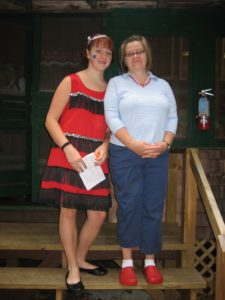This weeks blog is by long time camper and staff member Julia Shenkar.
It means I need a minute. I need a minute to myself. I need a minute to observe what’s going on around me. I need a minute to think through what I’m about to say or do. I need a minute to listen to others. I need a minute to absorb information. I need a minute to identify my needs. I need a minute to get comfortable.
In my adult life, this works out great. I live by myself and I have an office with a door on it, so, whenever I need a minute, I can take one. But what happens at a place like Runoia where there are no doors or solo living situations? What happens when an introverted child needs a minute?
At home, a child may have her own room to retreat to at the end of the day. She can sit and read her book or draw without interruption, and her parents recognize times when she may need to take a step back. At camp, however, this is a little challenging. Living in a cabin with nine or more other girls and no doors between you can come as a culture shock. Camp presents a child with constant stimulation—there is always someone to talk to or somewhere to be or something to do. This is an engaging, special, and unique experience, but it can be completely overwhelming. Especially for first-time campers, a flood of emotions may come pouring out in those first few days of camp as a result of over-stimulation.
Is she homesick? Is she actually sick? Is she mad? Is she not having fun?
Chances are, probably not. The child may just be super overwhelmed and wondering when she’s going to have time to herself – when she’ll be able to take a minute.
In a camp community, there’s going to be a mixture of introverts, extraverts, and ambiverts, and it’ll be a challenge managing everyone. Here are a few ways to help an introverted camper ease in to camp life, straight from a textbook introvert’s mouth:
- Recognize her need for space. It’s a counselor’s job to make sure that her campers are getting the most out of the Runoia experience. However, downtime in-between activities and meal times can be a great opportunity to let your introvert do her thing—to take a minute. Shack bonding can be a lot of fun, but make sure that there’s a balance of structured and unstructured free time.
- Check-in. Your introverted camper may not want to sit and have an idle conversation with you, but she will value your attention. Simply saying “hello” in passing or asking how her day was can really leave an impression and opens up the door for conversation, if the child is interested. Let her know of activities the cabin may be doing before dinner. “Hey, Anna! A few of us are taking a walk down the nature trail. Do you want to come?” This gives your introvert an option while letting her know that she’s being thought of. Some campers may see an introvert as standoffish, but really she’s just not sure how to involve herself. Letting her know that she is welcome to join in on group activities during downtime is a great way to start building relationships.
- Find her strength. It’s redundant, but introverts are really good at what they’re good at. Introverts like to latch on to topics of interest and really dig into the details. They want to learn everything there is to know about the subject of interest and avoid things that aren’t really their speed – an expert vs. a jack of all trades. For me, my strength was sailing. In most other activities, I stood more to the side and let others take the lead because, as an introvert, I am uncomfortable jumping into an activity without making sure I really understand what’s going on. Sailing came naturally to me and, even as an eight year old, I was confident enough to get on a boat and flex my nautical muscles. If you help your introvert identify an activity that they truly excel at, their light can truly shine as they help fellow campers learn new skills and assist counselors in lessons.
- Realize that “introversion” and “shyness” are not synonymous. I’ll use myself as a prime example for this. Once I found my niche at camp, you couldn’t tell I was an introvert. As a young girl, it was really difficult for me to hear “oh, she’s just being shy” when I was at large gatherings – especially that first day of camp or at meal times. I wasn’t shy (and I’m still not!); I just didn’t know what to say! I hadn’t established the feel of the group. Once I am able to take the time to step back, take a minute, and observe each and every element of a situation, my personality can start to emerge.
Camp is tricky for an introvert. They usually like smaller groups, but in small groups of people they don’t know, it’s easier to be singled out. At camp, it’s hard to be anonymous—which is what I think a lot of introverts try to do in school. At camp, a child is kind of put on the spot.
But this is what makes camp so special—this blending of different personalities and backgrounds. It’s challenging for everyone the first time around … or the second, and maybe the third! As an extroverted camper, it’s important to recognize that your fellow shack-mate might not want to play “Spit” all the time. As an introvert, you’ve got to understand that there are going to be times where you’ll need to engage. Balance is difficult, but a major key.
Whether you’re an introverted or extroverted member of the Runoia community, we all need to remember that sometimes everyone needs a minute.

